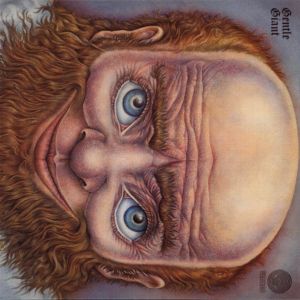
- Format: MP3

japan SHM-CD Remaster
Astonishingly daring debut album, not as focused or overpowering as King Crimson's first but still crashing down barriers and steamrolling expectations. The mix of medieval harmonies and electric rock got stronger on subsequent albums, but the music here is still pretty jarring.
Kerry Minnear was probably the only prog rock keyboard player of the era who allowed his synthesizers to sound like themselves and not mimic orchestras; Gary Green's guitars are alternately loud and brittle or soft and lyrical, and always surprising; and the presence of saxes and trumpets (courtesy of Phil Shulman) was unusual in any rock band of the era — all of which explains how Gentle Giant managed to attract a cult following but hadn't a prayer of moving up from that level of recognition.
"Funny Ways" was the softest prog rock song this side of Crimson's "I Talk to the Wind," but a lot of the rest is pretty intense in volume and tempo changes. "Nothing at All" by itself is worth the price of purchase.
Formed at the dawn of the progressive rock era in 1969, Gentle Giant seemed poised for a time in the mid-'70s to break out of its cult-band status, but somehow never made the jump. Somewhat closer in spirit to Yes and King Crimson than to Emerson, Lake & Palmer or the Nice, their unique sound melded hard rock and classical music, with an almost medieval approach to singing.
Gentle Giant was born out of the ruins of Simon Dupree & the Big Sound, an R&B-based outfit led by brothers Derek, Ray, and Phil Shulman. After switching to psychedelia in 1967 and scoring their only major hit that year with "Kites," as Gentle Giant the group abandoned both the R&B and psychedelic orientations of the previous band; Derek sang and played guitar and bass, Ray sang and played bass and violin, and Phil handled the saxophone, augmented by Kerry Minnear on keyboards, and Gary Green on guitar. Their original lineup also featured Martin Smith on drums, but they went through several percussionists in the first three years of their existence.
In 1970, Gentle Giant signed to the Vertigo label, and their self-titled first album — a shockingly daring work mixing hard rock and full electric playing with classical elements — came out later that year. Their second effort, 1971's Acquiring the Taste, was slightly more accessible and their third, Three Friends, featuring Malcolm Mortimore on drums, was their first record to get released in the U.S. (on Columbia). Their fourth album, 1973's Octopus, looked poised for a breakthrough; it seemed as though they had found the mix of hard rock and classical sounds that the critics and the public could accept, and they finally had a permanent drummer in the person of John Weathers, an ex-member of the Graham Bond Organisation.
In 1974, however, Gentle Giant began coming apart. Phil Shulman decided to give up music after the Octopus tour, and became a teacher. Then the group recorded the album In a Glass House, their hardest-rocking record yet, which Columbia's U.S. arm rejected as too uncommercial. The two-year gap in their American release schedule hurt their momentum, and they weren't heard from again until the Capitol release of The Power and the Glory in 1975.
Gentle Giant released Free Hand, their most commercial album, in 1976, but then followed it up with the jarringly experimental Interview. After the 1978 double-album Playing the Fool, the group went through a seeming change of heart and issued a series of albums aimed at mainstream audiences, even approaching disco, but by the end of the 1970s their popularity was in free-fall. Minnear, who had been playing an ever-more central role since the mid-'70s, had already left the group when Gentle Giant called it quits in 1980. Ray Shulman later became a producer and had considerable success in England working with bands like the Sundays and the Sugarcubes, while Derek Shulman became a New York-based record company executive.